| |||||||||||||||||
| |||||||||||||||||
 County results Bradley: 50–60% 60–70% Tritle: 50–60% No Data/Vote: | |||||||||||||||||
| |||||||||||||||||
| Elections in Nevada |
|---|
 |
The 1870 Nevada gubernatorial election was held on November 8, 1870, in order to elect the Governor of Nevada. The Democratic nominee Lewis R. Bradley won the election against Republican nominee and Nevada State Senator Frederick Augustus Tritle. [1]

